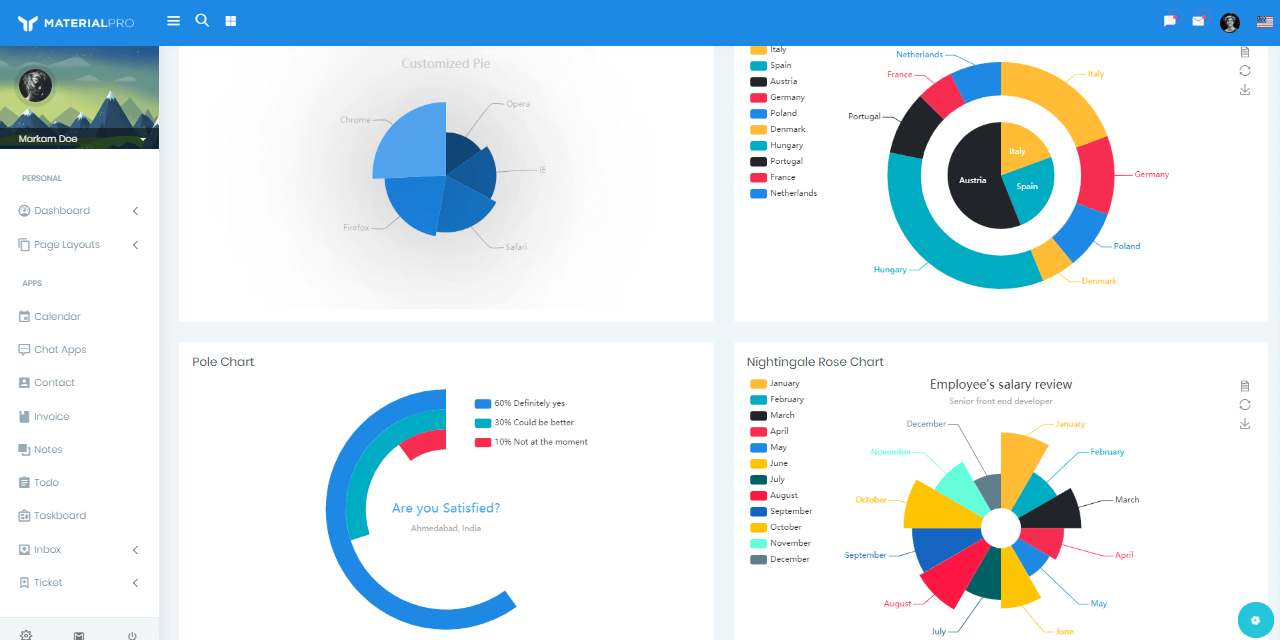Template boilerplate code used by AppSeed to generate simple starters coded in Flask - Features:
- UI Kit: MaterialPro Dashboard (Premium Version) by WrapPixel
- Render Engine: Flask / Jinja2
- Deployment scripts: Docker, Gunicorn/Nginx, HEROKU
- Support via Github (issues tracker) and Discord.
Links
- Material PRO Wpx Jinja - LIVE Demo
- Material PRO Wpx Flask - Full-stack version (Flask)
- Material PRO Wpx Django - Full-stack version (Django)
UI Kit - MaterialPro Bootstrap Admin
Vendor Notes - WrapPixel’s MaterialPro Bootstrap Admin is a premium bootstrap material design template comes packed with new, fresh, and attractive designs and ready-to-use components. Based on the popular Bootstrap 4 framework and inspired by Google’s material design, the materialPro Bootstrap Admin template is bundled with multiple third-party plugins that make it an excellent standalone solution.
MaterialPro Bootstrap Admin Bootstrap Admin dashboard is versatile, user-friendly and has a clean code structure that optimizes the development cost and time. The smoothness and efficiency in using a customizable admin dashboard are felt with the reliable design inspiration by Google’s material design.
Links
- MaterialPro Bootstrap Admin - product page
- MaterialPro Bootstrap Admin Docs
$ # Clone the sources
$ git clone https://github.com/app-generator/priv-jinja-material-wpx-pro.git
$ cd priv-jinja-material-wpx-pro
$
$ # Virtualenv modules installation (Unix based systems)
$ virtualenv env
$ source env/bin/activate
$
$ # Virtualenv modules installation (Windows based systems)
$ # virtualenv env
$ # .\env\Scripts\activate
$
$ # Install requirements
$ pip3 install -r requirements.txt
$
$ # Set the FLASK_APP environment variable
$ (Unix/Mac) export FLASK_APP=run.py
$ (Windows) set FLASK_APP=run.py
$ (Powershell) $env:FLASK_APP = ".\run.py"
$
$ # Set up the DEBUG environment
$ # (Unix/Mac) export FLASK_ENV=development
$ # (Windows) set FLASK_ENV=development
$ # (Powershell) $env:FLASK_ENV = "development"
$
$ # Run the Jinja Template
$ # --host=0.0.0.0 - expose the app on all network interfaces (default 127.0.0.1)
$ # --port=5000 - specify the app port (default 5000)
$ flask run --host=0.0.0.0 --port=5000
$
$ # Access the UI in browser: http://127.0.0.1:5000/The project has a simple structure, represented as bellow:
< PROJECT ROOT >
|
|-- app/__init__.py
|-- app/
| |-- static/
| | |-- <css, JS, images> # CSS files, Javascripts files
| |
| |-- templates/
| | |
| | |-- includes/ # Page chunks, components
| | | |
| | | |-- navigation.html # Top bar
| | | |-- sidebar.html # Left sidebar
| | | |-- scripts.html # JS scripts common to all pages
| | | |-- footer.html # The common footer
| | |
| | |-- layouts/ # App Layouts (the master pages)
| | | |
| | | |-- base.html # Used by common pages like index, UI
| | | |-- base-fullscreen.html # Used by auth pages (login, register)
| | |
| | index.html # The default page
| | login.html # Auth Login Page
| | register.html # Auth Registration Page
| | page-404.html # Error 404 page (page not found)
| | page-500.html # Error 500 page (server error)
| | *.html # All other pages provided by the UI Kit
|
|-- requirements.txt
|
|-- run.py
|
|-- ************************************************************************The project comes with a basic configuration for Docker, Gunicorn, and Waitress.
Docker execution
The steps to start the template using Docker:
Get the code
$ git clone https://github.com/app-generator/priv-jinja-material-wpx-pro.git
$ cd priv-jinja-material-wpx-proStart the app in Docker
$ sudo docker-compose pull && sudo docker-compose build && sudo docker-compose up -dVisit http://localhost:5005 in your browser. The app should be up & running.
Gunicorn 'Green Unicorn' is a Python WSGI HTTP Server for UNIX.
Install using pip
$ pip install gunicornStart the app using gunicorn binary
$ gunicorn --bind 0.0.0.0:8001 run:app
Serving on http://localhost:8001Visit http://localhost:8001 in your browser. The app should be up & running.
Waitress (Gunicorn equivalent for Windows) is meant to be a production-quality pure-Python WSGI server with very acceptable performance. It has no dependencies except ones that live in the Python standard library.
Install using pip
$ pip install waitressStart the app using waitress-serve
$ waitress-serve --port=8001 run:app
Serving on http://localhost:8001Visit http://localhost:8001 in your browser. The app should be up & running.
- Flask Framework - The official website
Material Dashboard PRO Wpx Jinja - Provided by AppSeed App Generator.
